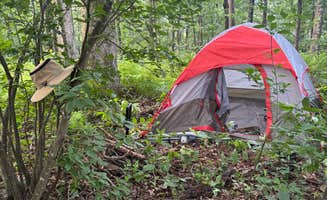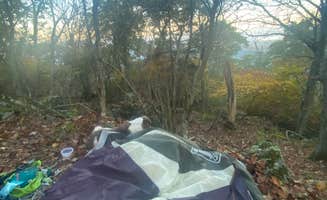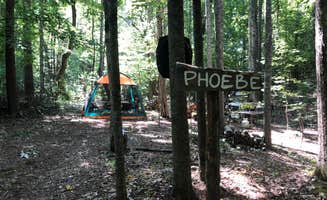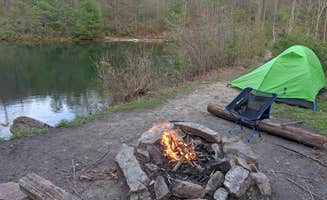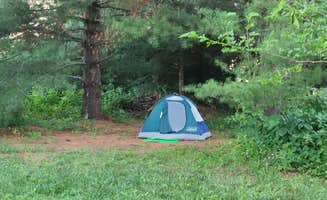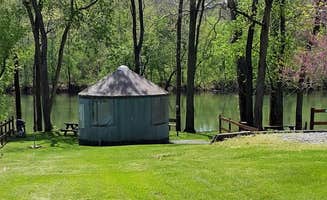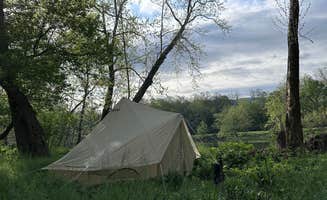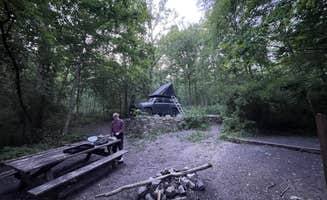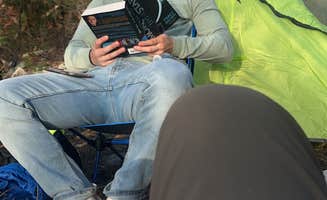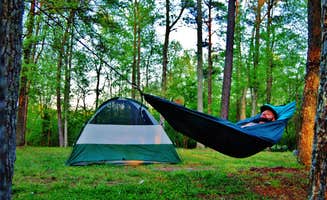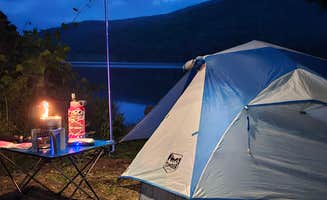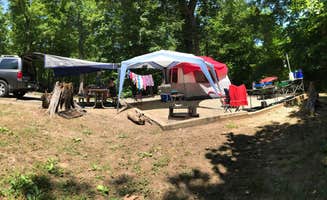Tent camping near Ruckersville, Virginia offers access to the Piedmont region where elevations range from 400 to 1,000 feet, creating mild microclimates with extended spring and fall camping seasons. The area sits at the eastern edge of the Blue Ridge Mountains, with average summer temperatures reaching 85°F during the day and dropping to 65°F at night. Tent sites throughout the region vary from open meadows to dense forest settings with differing ground conditions.
What to do
Fishing from your campsite: At Canoe Landing Group Campsite, you can cast your line without wandering far. "Camping along the river at the Canoe Landing Campground is great in the slower seasons. The sites are pretty close together so I'm sure it would be much more cramped when it's busy but it's a beautiful place. And you can fish right off the bank less than 50 yards from your tent," notes Christina.
Swimming in clear water: The spring-fed pond at Emerald Pond Primitive Campground provides a natural swimming spot during summer months. "We hike this bird knob trail all the time and usually end it by swimming across emerald pond. It's the perfect temperature (in July and august when we've done it). We hang a hammock and let the kids play. There's wild blackberries everywhere," shares a camper who identifies as E.R.
Stargazing without light pollution: The open skies at James River State Park create perfect star-viewing opportunities. "The night sky was amazing. You could see stars for miles. Enjoyed a nice sunset by the river," reports Kaylee G. after camping at Walnut Grove. Some campgrounds even offer astronomical equipment for visitor use.
What campers like
Secluded camping options: Phantom Hill Forest Farm provides private, primitive tent sites that are easily accessible. "We had a great time at Phantom Hill. The sites are large and primitive. We had no trouble getting down there in the jeep. We appreciated the dishes/kitchen set up, games, and the adorable outhouse," writes RL.
Well-maintained facilities: Lake Anna State Park Campground keeps their bathhouses in excellent condition. "Nice trails, decent campsites, cabins! The paved handicapped-accessible trail and fishing platforms are a really nice addition," notes one camper. Another mentions, "Bath house clean, but toilet paper is thinner than dry onion skin."
Wildlife encounters: Laurel Prong Trail Dispersed camping offers close encounters with native animals. "About as flat as you'll get, the hike here was nice. It's a decently private spot with the trail close by, bugs weren't bad only gripe was bears were constantly checking out our tent during night," reports Allan M., who recommends keeping all food scents away from tents.
What you should know
Fire restrictions vary by location: While many campgrounds allow fires, parks within Shenandoah National Park boundaries often prohibit them. Allan M. notes at Laurel Prong Trail: "We had one beef stick (trash thrown in our hang bag of course) but after one bear sniffed that sucker out 15 minutes later while we were in our tent we heard the first one full sprint and slobbering to check it out."
Water sources require planning: At Rock Tavern River Kamp, drinking water is available at campsites, but many dispersed camping areas require bringing your own. Jon N. describes Emerald Pond: "The pond itself is beautiful and spring fed, meaning you will always have a source of water. It should still be filtered, but anyone out backpacking would have a water filter on them."
Permit requirements for backcountry sites: Tent camping in Shenandoah National Park requires permits for overnight stays. Nora S. mentions, "This campsite is another one we found on a list provided by Shenandoah's park rangers and was listed as moderate hike and easy camping. I think, just like some other on the list, the easy camping might be a slight exaggeration."
Tips for camping with families
Choose sites with easy water access: Walnut Grove at James River State Park offers family-friendly sites near water. "We were not prepared for the stairs. They say walk in but it's a more a short hike. So getting our gear (we aren't minimalist people) in was a workout but worth it. On a gorgeous cove, you don't have the waves from the boat traffic on the rest of the lake. It was wonderful for our paddle boards," shares Alisa C.
Look for educational opportunities: Hawk Nest Mushroom Farm combines camping with learning experiences. "This place was incredible! Accessibly located and cute as all get out!" writes Elliot F. Another camper adds, "The camp host Orv has a very unique campsite setup not too far from the house/mushroom farm area. We got a nice tour of the mushrooms currently growing at the farm."
Consider noise factors: Campgrounds vary widely in noise levels and privacy. At Lake Anna State Park, a camper noted: "Very nice, plenty to see and do, but very crowded and noisy, even after quite time." For tent camping with children near Ruckersville, Virginia, choose sites further from main gathering areas for better sleep conditions.
Tips from RVers
Level sites are limited: Throughout the Ruckersville area, truly level tent pads can be hard to find. Lake Anna State Park offers some of the better options. "Great space for rvs and tents. Cabins and yurts available, bath house clean, but toilet paper is thinner than dry onion skin. Beach area is 1/2 mile paved walk," reports J A.
Water and electric hookups: While primitive tent camping dominates the Ruckersville area, Lake Anna State Park Campground provides some sites with amenities. "For being a state park, Lake Anna is one of the best I've been to. Although we only tent camped, I noticed a lot of things about the campground that would welcome RVs as well. There were large back-in sites as well as pull-through sites," writes Myron C.
Road access considerations: Access roads to some campgrounds can be challenging. One Hawk Nest Mushroom Farm visitor commented, "The camp area sits under a canopy of cedar trees. If you are tent camping or have a camper van the area is fine. Large RV will have a difficult time setting up in the camp area."


